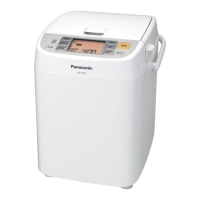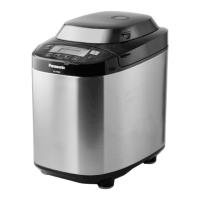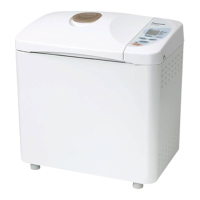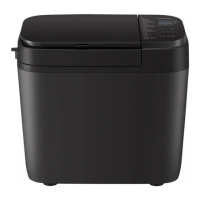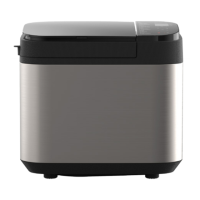EN14
Basic weight of each spoon (level off with supplied measuring spoon)
In case of changes of recipe and type of ingredients
In case of adding eggs or milk
Tablespoon Teaspoon
Granulated sugar Approx.12
g
Approx. 4
g
Milk powder Approx. 6
g
Approx. 2
g
Salt
Approx. 5
g
Instant Dry yeast
Approx. 2.8
g
Natural yeast
(raw)
Approx. 10
g
Natural yeast
(fermented)
Approx. 12.5
g
Reduce the water in the same quantity of eggs or milk.
Egg (1 at most)
Milk (half of water amount at most)
Ӫ
Put egg and other ingredients into the cup
and then add water for measurement.
Ӫ
Do not use timer.
(Eggs or milk go rotten quickly if your
room temperature is high.)
Adjust according to personal preference based on the following quantities.
Ӫ
Increasing the amount of sugar will darken the crust.
Decreasing the amount will lighten the crust and reduce
the height.
Ӫ
Bread will be less chewy without salt.
Enzymatic activity of natural yeast is strong, while salt
can control it. Enzymes will be over-activated without
salt. Thus, the bread cannot form properly with gluten
broken.
Ӫ
Margarine can be used to substitute butter, honey can
subsitute sugar and milk can subsitute milk powder.
(P. EN12)
Honey shall not exceed 25
g
One tablespoon of milk powder is equivalent to
70
g
(Approx. 70 mL) milk.
Ingredients To increase To decrease
Butter
May be increased
by 150%
(
except for brioche
)
May be decreased
by 50%
Granulated
sugar
May be increased
by 100%
May be decreased
by 50%
Milk powder
May be increased
by 100%
May be exempted
Salt
May be exempted
May be reduced
by 50% for rice
flour bread and
natural yeast
bread
Bread-making ingredients (Continued)
( )

